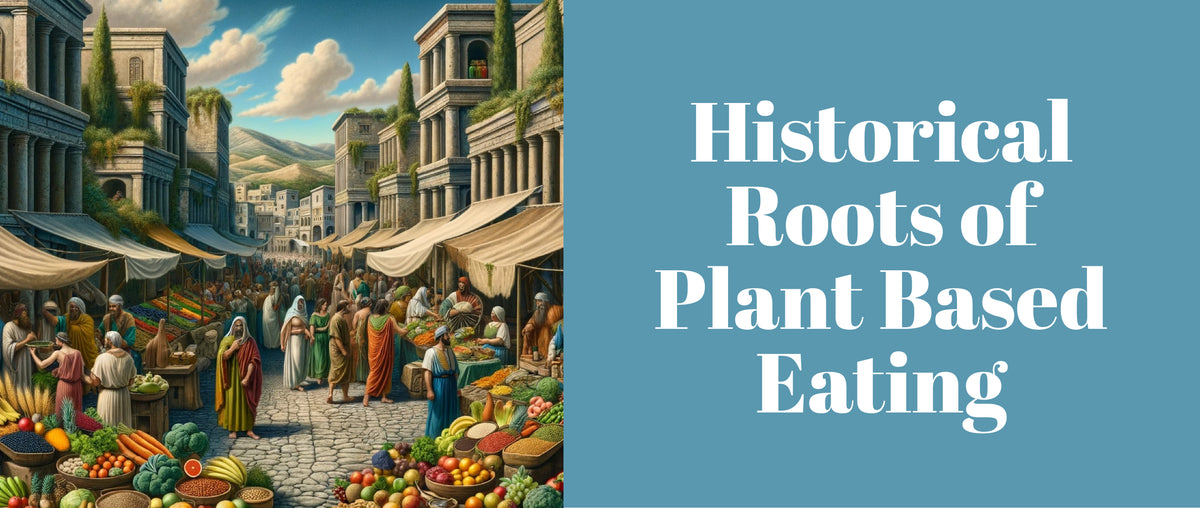Historical Roots of Plant Based Eating
The rise of plant based diets is not just a modern trend but a revival of ancient practices deeply rooted in various cultures, religions, and philosophies. Understanding the historical roots of healthy eating provides valuable insights into its spiritual, ethical, and health dimensions.
Key Takeaways
- Ancient Civilizations: Practiced plant based diets for spiritual and ethical reasons.
- Major Religions: Hinduism, Buddhism, and Jainism have long histories of vegetarianism.
- Historical Figures: Influencers like Pythagoras and al-Ma'arri promoted plant based diets.
- Colonization: Changed dietary habits but couldn't completely erase traditional plant based diets.
- Modern Movements: Emphasize health, ethics, and environmental sustainability of plant based diets.
Historical Background of plant based Eating
Ancient Civilizations
Ancient civilizations have evidence of plant based diets, often tied to their cultural and religious practices.
- Indus Valley Civilization: Archaeological findings suggest a diet rich in grains, fruits, and vegetables.
- Egypt: Ancient Egyptians consumed a diet primarily based on bread, beer, and vegetables.
Religious Influence
Religion has played a significant role in promoting plant based diets.
- Hinduism: Emphasizes non-violence (Ahimsa) and often promotes vegetarianism as a way to respect all living beings.
- Buddhism: Advocates for a diet that avoids harm to animals, reflecting beliefs in reincarnation and compassion.
- Jainism: Practitioners follow a strict vegetarian diet to avoid harm to all living beings, reflecting their commitment to Ahimsa.

Prominent Historical Figures
Pythagoras
Pythagoras, an ancient Greek philosopher, is one of the earliest recorded advocates for vegetarianism. His teachings were rooted in ethical and spiritual beliefs that influenced many of his followers.
Al-Ma'arri
Al-Ma'arri, an Arab poet, advocated for veganism through his works, promoting a diet free from animal products based on ethical and personal health reasons.
Impact of Colonization
Colonization significantly impacted dietary practices worldwide.
- Dietary Shifts: Colonizers introduced meat-heavy diets in regions where plant based eating was prevalent.
- Cultural Persistence: Despite these changes, many cultures retained their traditional plant based diets, integrating new elements without abandoning their roots.
Industrialization and Dietary Changes
- Agricultural Revolution: Led to mass production of meat and dairy, changing the global diet landscape.
- Vegetarian Societies: Emerged in the 19th and 20th centuries, promoting plant based diets and influencing modern vegetarian and vegan movements.
Vegetarian Nutrition
Understanding the nutritional aspects of a vegetarian diet is crucial for those considering this lifestyle.
- Essential Nutrients: plant based diets can provide all essential nutrients if well-planned, including proteins, vitamins, and minerals.
- Health Benefits: Reduced risk of chronic diseases such as heart disease, diabetes, and certain cancers.
Religion, Culture, and plant based Diets
Different cultures and religions have unique approaches to plant based diets.
- Global Perspectives: From Indian vegetarianism to Mediterranean diets rich in plant based foods, cultural practices reflect a diverse approach to plant based eating.
Literature and Vegetarianism
Vegetarianism has been referenced in various historical texts, influencing public perception and acceptance.
- Historical Texts: Ancient literature often includes references to plant based diets, highlighting their significance in different cultures.
- Modern Literature: Contemporary works continue to explore and promote the benefits of vegetarianism.
Ancient Protein Alternatives
Before the advent of modern protein sources, ancient cultures relied on various plant based proteins.
- Legumes and Pulses: Common sources of protein in ancient diets included beans, lentils, and chickpeas.
The Birth of the Vegan Society
The Vegan Society, founded in 1944, played a pivotal role in promoting veganism globally.
- Formation: Established to advocate for a lifestyle free from animal exploitation.
- Impact: The society's efforts have significantly influenced the global vegan movement, raising awareness about ethical and health aspects.
Veganism in Different Cultures
Veganism is practiced differently across the world, reflecting diverse cultural adaptations.
- Regional Practices: Various cultures have unique vegan dishes and traditions, showcasing the adaptability of veganism.
Also Read
Modern Day Vegans
Today's vegans choose this lifestyle for various reasons, influenced by health, ethics, and environmental concerns.
- Lifestyle Choices: Health benefits, ethical considerations, and environmental impact drive many to adopt veganism.
- Influence of Social Media: Digital platforms have played a crucial role in promoting veganism and connecting like-minded individuals.
The Future of Veganism
The future of veganism looks promising, with trends pointing towards increased adoption and innovation.
- Trends and Predictions: Growing awareness of health and environmental issues is likely to drive more people towards plant based diets.
- Sustainability: Veganism is increasingly seen as a sustainable alternative, addressing concerns about animal welfare and environmental conservation.
Conclusion
Understanding the historical roots of plant based eating highlights its deep cultural, religious, and philosophical significance. As we look to the future, the principles that have guided plant based diets for centuries continue to inspire and shape modern practices.
Craving a delicious vegan meal? Look no further! We've got a guide to the best vegan restaurants in India, ready to help you discover amazing plant-based eats in your city.










